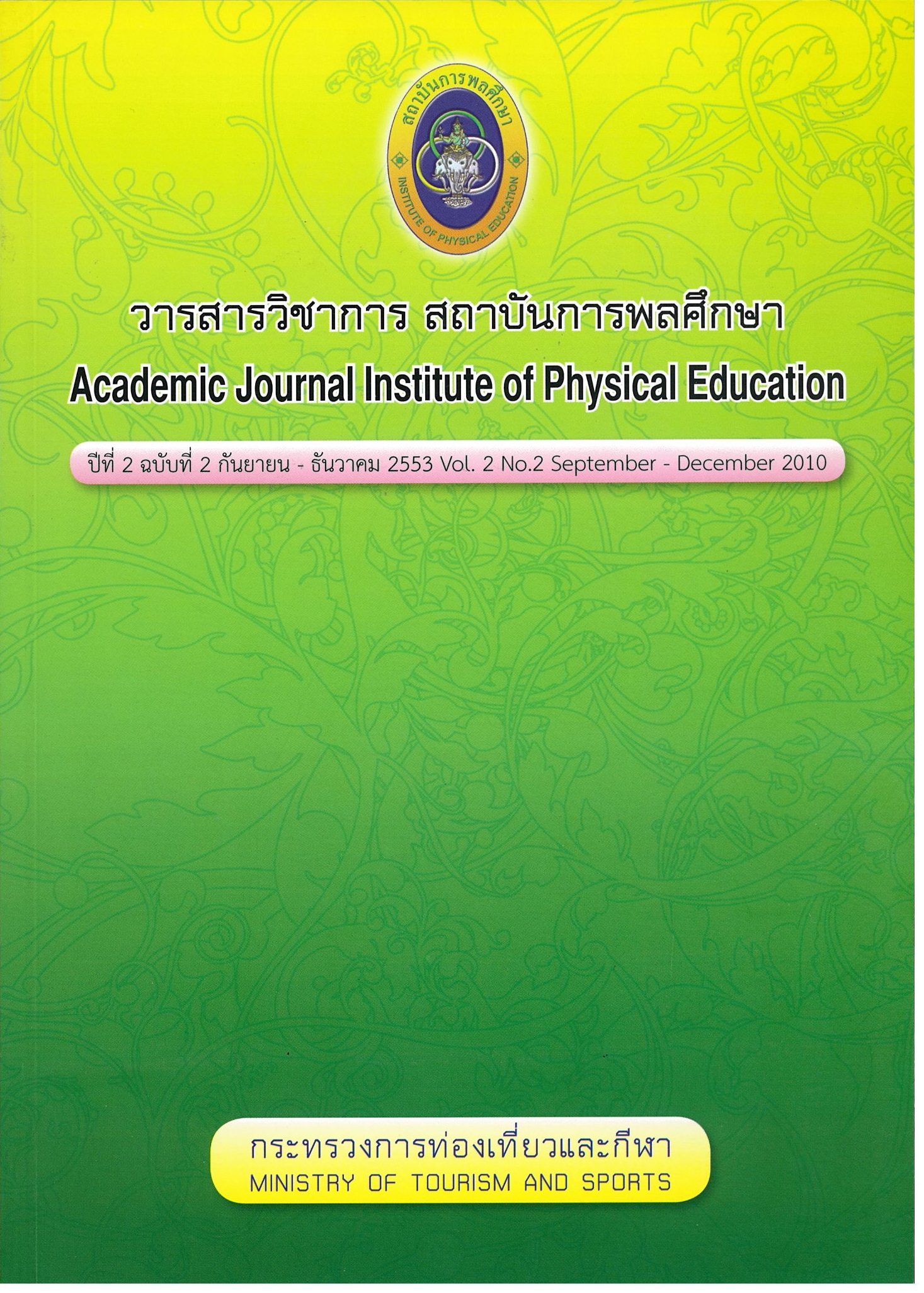Problems and Needs in Good Governance Management of the Personnel in the Institute of Physical Education
Main Article Content
Abstract
The purposes of this research were 1) to study the problem and needs in Good Governance Management of the Personnel in the Institute of Physical Education and 2) to compare the problem and needs in Good Governance Management of the Personnel in the Institute of Physical Education. Total 265 persons consisted of 51 Executive Officers and 214 Instructors were random sampling covered 17 Campus of Institute of Physical Education
through of Thailand. The Percentage, Arithmetic Mean, Standard Deviations and t-test were calculated from the questionnaires. The results of research were summarized as follow:
- Overall figure of problem in Good Governance Management of the Personnel in the Institute of Physical Education is in a medium level.
- Overall figure of needs in Good Governance Management of the Personnel in the Institute of Physical Education is in a high level of requirement.
- There was significantly difference of Problem of Executive Officers and Instructors to Good Governance management. The difference was statistically significant at level of 0.05
- There was no any difference of Needs of Executive Officers and Instructors to Good Governance management.
Article Details
The published article is a copyright of the Academic Journal of Thailand National Sports University. The passage appeared in each article in this academic journal is a perspective of each author which is not related to the journal. Each author is required to be responsible for all components of his/her own article. If there are any mistakes, each author must be responsible for those mistakes on his/her own.
References
กวี รักษ์ชน. (2543). แนวคิดเชิงทฤษฎีในการบริหารรัฐกิจ. กรุงเทพฯ: คณะรัฐศาสตร์มหาวิทยาลัยรามคําแหง.
เกษม วัฒนชัย. (2546). ธรรมาภิบาลกับคอรัปชั่นในสังคมไทย. กรุงเทพฯ: อัมรินทร์ปริ้นติ้งแอนด์พับลิสซิ่ง.
เจือจันทร์ จงสถิตอยู่. (2543). คนเด่น, วารสารนักบริหาร,21:3-6.
บุญอนันต์ บุญสนธ์. (2543). พัฒนาการของแนวคิดการจัดการที่ดี. กรุงเทพฯ : สภาวิจัยแห่งชาติ.
บุญเลิศ ทิพจร. (2544). แนวทางการมีส่วนร่วมของชุมชนในการบริหารโรงเรียนประถมศึกษาตามทัศนะของบุคลากรในชุมชนอําเภอแม่แจ่ม จังหวัดเชียงใหม่, วิทยานิพนธ์ศึกษาศาสตรมหาบัณฑิต บัณฑิตวิทยาลัยมหาวิทยาลัยเชียงใหม่.
ประเวศน์ มหารัตน์สกุล. (2551). การจัดการทรัพยากรมนุษย์มุ่งสู่อนาคต. กรุงเทพฯ : โรงพิมพ์ ส.เอเซียเพรส.
เพ็ญแข แสงแก้ว. (2541). การวิจัยทางสังคมศาสตร์, กรุงเทพฯ : โรงพิมพ์หาวิทยาลัยธรรมศาสตร์ จํากัด.
มาลี รักสกุลใหม่. (2544). แนวทางการพัฒนาผู้บริหารโรงเรียนคริสเตียนในจังหวัดเชียงใหม่, วิทยานิพนธ์ศึกษาศาสตรมหาบัณฑิต บัณฑิตวิทยาลัยมหาวิทยาลัยเชียงใหม่.
ยันยงค์ สูงงาม. (2545). การดําเนินงานประกันคุณภาพการศึกษาเพื่อรองรับการประเมินภายนอกของสถานศึกษา อําเภอแจ้ห่ม จังหวัดลําปาง, วิทยานิพนธ์ศึกษาศาสตรมหาบัณฑิต บัณฑิตวิทยาลัย มหาวิทยาลัยเชียงใหม่.
ร็อบบินส์, สตีเฟนส์ พี. (2551). การจัดการและพฤติกรรมองค์การ. แปลโดยวิรัช สงวนวงศ์วาน, กรุงเทพฯ: เพียร์สัน เอ็ดดูเคชั่น อินโดไชน่า.
วนิดา แสงสารพันธ์. (2543). การบริหารจัดการแบบธรรมาภิบาล. วารสารนักบริหาร, 21: 4.
วันชัย รัตนศัพท์. (2546). “การมีส่วนร่วมกับการพัฒนาองค์กร”ระบบทวิภาคีกับการแก้ปัญหาแรงงานในรัฐวิสาหกิจ. ชลบุรี: กระทรวงแรงงาน (เอกสารการสัมมนานายจ้างและลูกจ้าง ภาครัฐวิสาหกิจ 6-8 มีนาคม 2546).
วิรัช นิภาวรรณ. (2545). การบริหารเมืองหลวงและการบริหารท้องถิ่น: สหรัฐอเมริกาอังกฤษ ฝรั่งเศส ญี่ปุ่น และไทย.กรุงเทพฯ: โฟร์เพซ.
สุขชัย ขันอัศวะ. (2541), การใช้อํานาจของผู้บริหารโรงเรียนประถมศึกษา สังกัดสํานักงานการประถมศึกษา อําเภอออมก๋อย จังหวัดเชียงใหม่, วิทยานิพนธ์ ศึกษาศาสตรมหาบัณฑิต บัณฑิตวิทยาลัยมหาวิทยาลัยเชียงใหม่.
สํานักงานเขตพื้นที่การศึกษาเชียงใหม่ เขต 5. (2547). แผนกลยุทธ์การจัดการศึกษาขั้นพื้นฐานสํานักงานเขตพื้นที่การศึกษาเชียงใหม่ เขต 5 ระยะ 4 ปี เชียงใหม่.
อัจฉรา โยมสินธุ์. (2543), บรรษัทภิบาลกลยุทธ์ธุรกิจแบบยั่งยืน. วารสารนักบริหาร, 21, 34-35.

